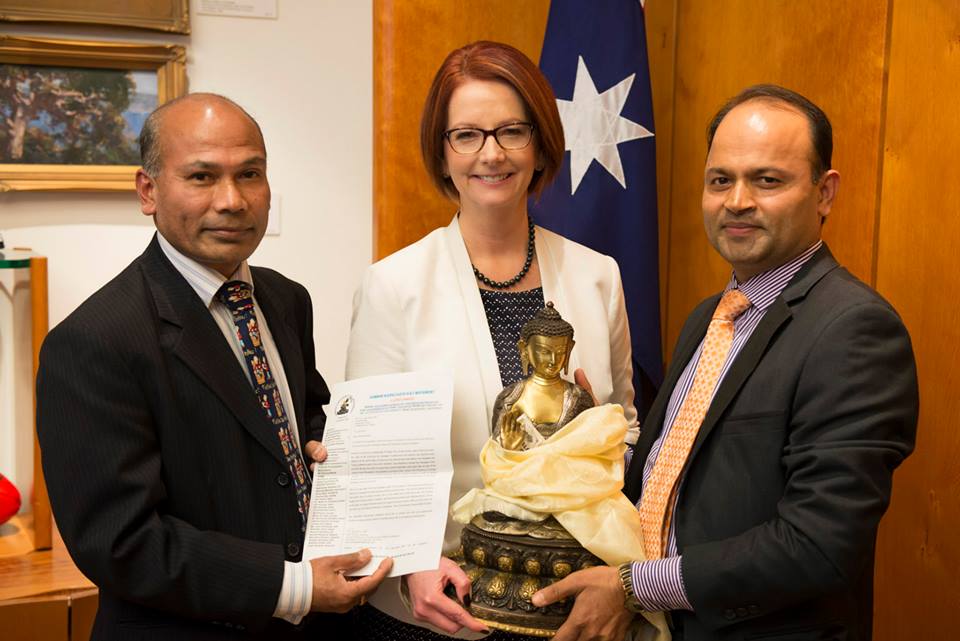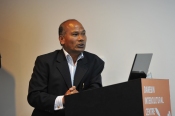As politicians and financiers bring their different perspectives to the APEC summit in Honolulu, a single idea is proving a unifying force. With global economic power shifting eastwards, the chorus of anti-China rhetoric is growing ever louder.
If there is one US state where the Occupy movement has little chance, it is probably Hawaii. Despite a high concentration of politicians and Wall Street bigwigs mingling at the APEC summit, the only place people are willing to occupy en masse here are the beaches. With one exception. The few protesters allowed in downtown Honolulu were speaking out against greed and social injustice. They were against economic inequality. They were against China.
Coincidentally or not, the mood on the podium was similarly hostile. Employing some of his sharpest language yet, US President Barack Obama threatened Beijing with punitive economic steps unless it started “playing by the rules.” His political opponents were even more belligerent.
“I happen to think that the Communist Chinese government will end up on the ash heap of history if they do not change their virtues,” Rick Perry, Republican presidential candidate, said in the course of the debates.
“We have to have China understand that, like everybody else on the world stage, they have to play by the rules!”responded his rival for the Republican nomination, Mitt Romney.
Rules, rules and again rules. As the country that has been ruling the roost for decades, the United States has never been shy of policing others. But as China’s GDP continues to grow at a rate of nine per cent a year, against two-and-a-half per cent growth in the US, the reprimand seems to be internally driven.
Conformity is one of the top values in the Chinese view of the world – also reflected in the country’s political and economic policies. So it is not that China does not play by the rules, it is actually quite the opposite. What the United States seems to have an issue with is that, increasingly, China rules and that is a privilege Washington would prefer to keep for itself.
As his signature achievement at APEC 2011, Barack Obama has put forward the Trans-Pacific Partnership, a regional free trade pact being negotiated by the United States and eight other countries. White House officials even speculated that the deal could become a template for an eventual APEC-wide free trade zone.
Yet what seems a win-win to the US is taken in China as a somewhat predatory effort to change rules mid-game. Beijing remains wary of the deal that Washington is proposing to some of China’s neighbors, seeing it as an effort to provide a counterweight to China around the Pacific Rim.
“Free trade tends to be in the eye of the beholder – it’s free for you, but protectionist for me, provided I get to protect my precious industries, my own personal national interest. So it’s always a dilemma as to how free it is,” said George Koo, the founder of International Strategic Alliances.
As the euro crisis continues metastasizing throughout the world and China is asked to shoulder the load, many analysts say the West should keep in mind its old adage – “He who pays the piper calls the tune.”
“The US is a declining power and having trouble adjusting to that status,” CEO of Country Risk Solutions, Daniel Wagner, believes.
Many Chinese proverbs are difficult to translate into English, although those about money usually have exact equivalents. One of them is “Money makes the world go round” – a concept experientially familiar to Washington and, progressively so, to Beijing.
Professor Julan Du from the Chinese University of Hong Kong told RT that America’s domestic problems are driving Washington’s criticism of Beijing.
“They accuse China of unfair trade and currency policies. I think it is unfair. The current difficulties of the US government in creating jobs lie in the fact that the US has lost the competitive advantage in most of the traditional manufacturing industries,” Professor Du said.
“The wage rate is too high to justify moving production back to the US,” he added. “So even if China reduced its exports to the US by increasing its exchange rates, other low-wage emerging countries would step in to replace China.”
@RT
35.387579
-85.962483
 EU officials have agreed to spend €120 billion “for immediate growth measures” to aid the most vulnerable countries of the eurozone. The announcement comes during the latest EU summit that has started in Brussels.
EU officials have agreed to spend €120 billion “for immediate growth measures” to aid the most vulnerable countries of the eurozone. The announcement comes during the latest EU summit that has started in Brussels.
















































